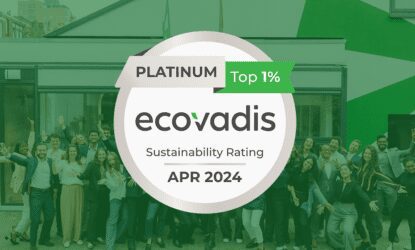 Stakeholder mapping for effective decarbonisation
Stakeholder mapping for effective decarbonisation
“Sustainability isn’t a cost, it’s an investment that fuels resilience, profitability, and long-term growth.”
Sustainability is no longer optional, it’s a strategic imperative. Climate change, resource constraints, and shifting stakeholder expectations are transforming how businesses operate. But sustainability isn’t just a compliance burden or PR tool; it’s a powerful driver of long-term success. The main benefits can be broken down into the 4 C’s:
Consumers, Costs, Capital, and Culture
Consumers
Today’s consumers are more informed and values-driven than ever. Sustainability is increasingly influencing purchasing decisions. A global PwC survey found that 80% of consumers are willing to pay more for sustainably sourced goods, and on average, they’re prepared to pay 9.7% more for environmentally friendly products—despite inflation and rising living costs (1).
Leading brands like Patagonia and IKEA have capitalised on this trend by embedding sustainability targets into their operations and supply chain management leading to increased customer loyalty and higher sales.
Support for environmental action is also gaining global visibility through initiatives like the 89 Percent Project, which highlights that between 80–89% of the world’s population wants governments to do more to address climate change, a sentiment that increasingly translates into consumer and investor expectations for business.
Moreover, companies that focus on ethical, environmental, and labour practices within their supply chains enjoy 3–4 percentage points higher profit margins than those that do not (2).
Costs
Sustainability initiatives often lead directly to cost savings. By reducing waste, optimising energy usage, and improving logistics, companies can significantly cut operational expenses. A report by McKinsey & Company found that organisations focusing on energy efficiency, waste reduction, and logistics optimisation can reduce costs by up to 9% (3). Furthermore, companies that shifted to renewable energy as part of their net zero commitments avoided major cost increases during the gas price spikes triggered by the Russia–Ukraine war.
Given that 70% of an organisation’s sustainability footprint is embedded in its supply chain (4), supply chain improvements are one of the most effective ways to reduce environmental impact and costs.
This cost-benefit alignment is backed again by EcoVadis and Bain, who found that companies with sustainable supply chains outperform others financially, enjoying higher margins and operational resilience (5).
Read more about engaging your supply chain from our newest factsheet.

Capital
Investors are increasingly scrutinising Environmental, Social, and Governance (ESG) performance when making decisions. Companies with high ESG scores are seen as lower risk, future fit investments and may benefit from better access to capital, lower costs of borrowing, and more investment opportunities.
A study by the Harvard Business Review found that companies with strong ESG performance can lower the cost of debt by up to 3% on average (6). Sustainability-linked loans, now offered by all major financial institutions, often carry interest rates that are 2.5–10 basis points lower than standard loans (7).
Furthermore, a 2024 survey suggests investors see approximately 6% revenue growth and between 6 and 7% multiple uplift in portfolio companies at exit from sustainability-linked value creation (8).
In addition, a global procurement study found that 77% of sustainable procurement leaders said their programmes helped them mitigate risk, with 37% reporting increased resilience (9).
Culture
Today’s workforce, particularly younger generations, wants to work for organisations that align with their values. ESG performance plays a crucial role in attracting and retaining talent. According to Deloitte, companies with strong ESG strategies experience 25% lower turnover among millennial employees, helping reduce recruitment costs and increase workforce stability (10).
Higher ESG ratings also translate into increased productivity. Research from Gallup shows that companies with high ESG scores see 13% higher employee productivity (11).
In short, a strong sustainability culture drives internal engagement, innovation, and long-term business health. And if you’re still not convinced by the financial benefits of ESG then this fantastic visual from a recent study by PRI and Bain & Co. sums it, literally (12).
(Source: Principles for Responsible Investment & Bain & Company, 2025, p. 12)
So where should you start?
One of the biggest pitfalls we see at Nexio Projects is companies taking action out of sequence—for example, trying to calculate a carbon footprint without having quality data in place. This leads to wasted time, unreliable outputs, and missed opportunities.
To succeed on your sustainability strategy roadmap, it’s critical to follow the right steps in the right order:
By taking a structured, data-driven approach, companies avoid common mistakes and unlock the full benefits of ESG planning.
In summary, investing in ESG frameworks doesn’t just help the environment and society; it also directly contributes to improved profitability, reduced risks, and enhanced market positioning, leading to better long-term financial performance.
Download our ESG reporting guide to take immediate action on your ESG strategy.

How can Nexio Projects support your ESG strategy?
Nexio Projects is a leading sustainability consultancy in the Netherlands, helping organisations transition from compliance to purpose through expert guidance in ESG ratings, climate strategies, and sustainability reporting. As a Certified B Corporation and a top boutique ESG consultancy recognised by Verdantix, our team of dedicated sustainability consultants and sustainability experts empower clients across industries to achieve meaningful goals with tailored solutions.
If you are looking for answers to questions such as the following, our ESG advisory team would love to connect:
- Need help with your ESG strategy?
- Seeking cost savings through decarbonisation initiatives?
- Wondering how you can incentivise your suppliers to become more sustainable?
- Interested in discussing ESG opportunities further?
Together, we can shape a more sustainable, profitable, and resilient future. Subscribe to our newsletter to receive regular ESG insights and enhance your sustainability leadership.
References
- PwC (2024) Voice of the Consumer Survey 2024. [Online] Available at: https://www.pwc.com (Accessed: 18 August 2025).
- EcoVadis & Bain & Company (2022) The ROI of Sustainable Procurement. [Online] Available at: https://ecovadis.com/library (Accessed: 18 August 2025).
- McKinsey & Company (2020) Sustainability in Supply Chains. [Online] Available at: https://www.mckinsey.com (Accessed: 18 August 2025).
- EcoVadis (n.d.) Sustainable Supply Chain Practices. [Online] Available at: https://ecovadis.com (Accessed: 18 August 2025).
- EcoVadis & Bain & Company (2023) Return on Sustainability: The Value and ROI of Sustainable Procurement. [Online] Available at: https://ecovadis.com/library (Accessed: 18 August 2025).
- Harvard Business Review (2019) The Impact of ESG Performance on Cost of Capital. [Online] Available at: https://hbr.org (Accessed: 18 August 2025).
- Reuters (2023) Sustainability-linked loans gain traction among global banks. [Online] Available at: https://www.reuters.com (Accessed: 18 August 2025).
- Principles for Responsible Investment, NYU Stern CSB & Bain & Company (2024) Sustainability-linked value creation in private markets survey. [Online] Available at: https://www.unpri.org (Accessed: 18 August 2025).
- EcoVadis (2024) Return on Sustainability: The Value and ROI of Sustainable Procurement. [Online] Available at: https://ecovadis.com/library (Accessed: 18 August 2025).
- Deloitte (2023) Gen Z and Millennial Survey 2023. [Online] Available at: https://www.deloitte.com (Accessed: 18 August 2025).
- Gallup (2020) The Relationship Between ESG Performance and Employee Productivity. [Online] Available at: https://www.gallup.com (Accessed: 18 August 2025).
- Principles for Responsible Investment & Bain & Company (2025) Sustainability Value Creation. [Online] Available at: https://www.unpri.org/private-markets/sustainability-value-creation/13332.article (Accessed: 18 August 2025).











